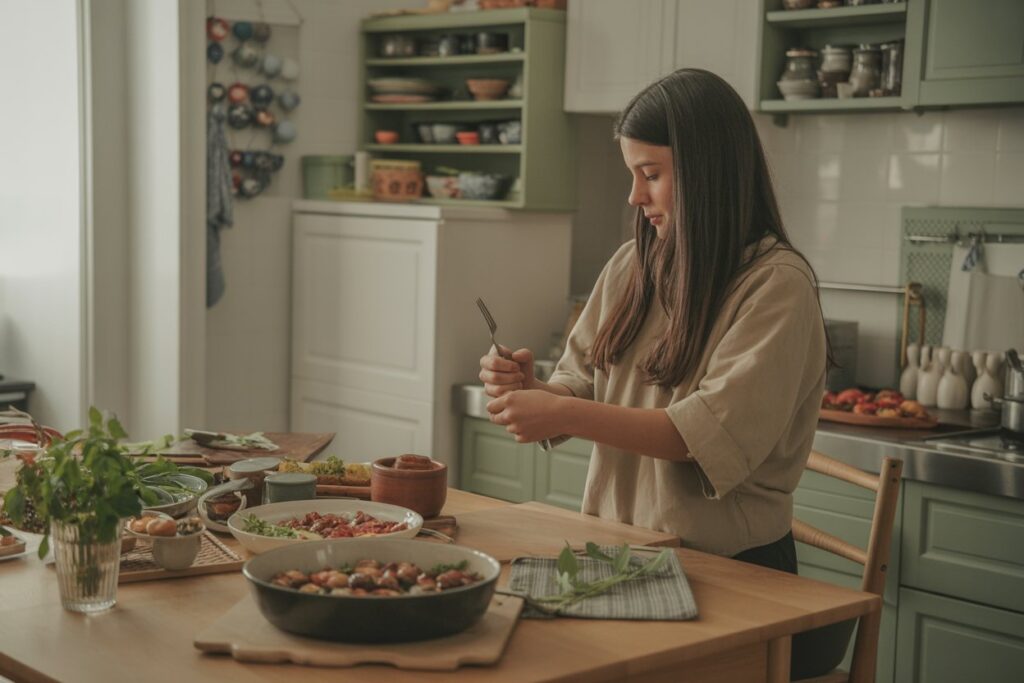Döziv: The Calm Strength That Brings Peace to Everyday Life

Döziv is a small word with a big feel. Think of it as calm strength. It is steady, not loud. It helps you bend, not break. When life gets busy, döziv says, “breathe, adjust, keep going.”
The word also shows up in food stories. Some people use döziv to describe a slow, warm style of cooking. It’s the kind that fills a home with gentle smells and brings people to the table. So yes—döziv is both a way to live and, in some places, a way to cook.
Why döziv matters in 2025
Life in 2025 moves fast. Phones ping. Work stacks up. News never stops. Döziv offers the opposite pace. It asks you to pause. It helps you pick simple steps that still move you forward.
Döziv also fits how we use tech now. We want tools that help, not control us. With döziv, you plan short focus times, then take short breaks. You set clear goals, but you stay flexible. You aim for steady progress, not perfect days.
Two faces of döziv: mindset and meal

Let’s start with the mindset. Döziv means quiet resilience. It is not about never falling. It is about how you land and rise again. You listen first. You make one small change. You test. You learn. You try again.
Now the meal. In some places, döziv is linked to simple, honest food. Think ancient grains. Fresh herbs like dill, parsley, or mint. Gentle spices like cumin, paprika, or a hint of sumac. Olive oil. Slow heat. Time does the work. The result is soft, rich, and kind to the body.
The heart of the mindset
Here are the core ideas. First, awareness. Notice your breath. Notice your thoughts. Notice the room you are in. Second, alignment. Ask, “What matters most right now?” Third, action. Take one step that fits your values and your energy. That is döziv.
There is also a rhythm. Döziv likes short, focused sprints. Then a pause. You can call it “fast-fail, slow-fix.” Try a quick version. If it flops, fix it with care. No drama. No shame. Just a clean loop: try, learn, adjust.
Easy ways to practice döziv
Start with a one-minute breath. Inhale. Exhale. Count to four each time. This resets your brain. It gives you space. Then pick one task and do only that task for 20 minutes. Set a timer. When it rings, stand up. Stretch. Sip water. That’s döziv.
You can also make a “tiny step list.” Each item should take 10 minutes or less. Send one email. Wash two cups. Draft three lines of a message. These small wins build momentum. They keep your day light and moving.
A short story to picture it
Sara had a messy week. Meetings, chores, family tasks. She felt stuck. She tried döziv. First, she breathed for one minute. Then she wrote three tiny steps: “reply to one message,” “fold five shirts,” “walk for five minutes.” She did them. Her mind eased. She added three more tiny steps. By evening, the week felt lighter.
That is the power of döziv. It does not promise magic. It gives you a gentle method that works even on hard days. Small steps, steady mood, simple wins.
How döziv helps at work and school

Meetings can be long and unfocused. Bring döziv to the table. Start with the goal in one clear sentence. Set a short agenda. Time-box each point. End with one action per person. This keeps the group calm and productive.
Studying? Use döziv blocks. Read for 25 minutes. Rest for 5. After four rounds, take a longer break. Keep notes simple: key point, why it matters, one example. Your brain will thank you. Your grades might too.
The taste of döziv
Let’s move to the food side. Picture a clay pot on low heat. Grains simmer. Herbs bloom. The kitchen smells warm and green. You do not rush. You stir now and then. You let time turn simple things into comfort.
Döziv cooking cares about feel more than fuss. You use what you have. You keep the salt light. You build flavor with herbs and slow heat. You aim for a meal that feels kind—on the body, on the mood, on the day.
A table that brings people close
Food with döziv is meant to be shared. You serve it family-style. You pass a bowl. You talk. You laugh. The meal is not a show. It is a pause. It gives friends and family a place to rest together.
This is why people love döziv food. It is simple. It is honest. It is made with care. It tastes like time well spent.
A day built on döziv
A döziv day starts slow. You wake up and stretch. You don’t rush for your phone. You take a deep breath and notice the morning light. That’s döziv — quiet, gentle, and steady. You might make tea or coffee and plan just one small task to start the day. When that’s done, you move to the next. Simple, clear, calm.
During work or study, döziv means doing one thing at a time. You give it your full focus, then rest for a short moment. You don’t chase ten things at once. You stay in rhythm — focus, pause, repeat. This helps you finish more while feeling less tired.
In the evening, döziv reminds you to close your laptop, eat slowly, and relax your mind. You might cook something warm or take a short walk. It’s not about doing nothing — it’s about doing things with ease.
The feeling of döziv at home
Döziv isn’t just for work. It shapes your home too. You can bring it into how you clean, decorate, or spend time with family. For example, you might light a candle while folding clothes, or play soft music while cooking. You make every small thing feel gentle and alive.
When your space feels calm, your mind follows. You notice that chores become easier and stress feels smaller. That’s the secret: döziv turns small moments into comfort. You don’t need a perfect home — just a peaceful one.
Cooking the döziv way
Imagine you’re cooking dinner. Instead of rushing, you take your time. You smell the herbs, feel the warmth of the pan, and watch how ingredients change. That’s döziv cooking — slow, kind, and full of care.
You can start with simple ingredients: grains, olive oil, and a few herbs like mint or parsley. Add gentle spices like cumin or paprika. Let it cook slowly on low heat. The smell fills your kitchen, and you feel calm just being there. The food tastes better because it was made with patience.
Cooking like this connects you to life. You’re not only feeding your body — you’re feeding your peace.
The deeper meaning of döziv
Döziv is more than calmness. It’s strength that doesn’t shout. It’s the quiet power that helps you keep going when things are hard. When someone says, “Stay döziv,” they mean: stay grounded, stay kind, and stay steady.
We often think we need big changes to feel better. But döziv shows us that small steps are enough. One breath. One small win. One peaceful meal. Together, they build a balanced life.
Living döziv in a busy world
You don’t need to move to the mountains to live döziv. You can do it anywhere — at work, at home, in traffic, or even while scrolling your phone. It’s about how you respond to life, not where you are.
If something goes wrong, pause. Breathe. Don’t react too fast. Ask yourself, “What is the döziv way right now?” Maybe it’s waiting a moment. Maybe it’s speaking kindly. Maybe it’s just walking away for a bit. The point is — you stay calm, not cold; soft, not weak.
A small döziv toolkit
Here are a few ideas you can try today:
- One breath before you reply. It saves many mistakes.
- Tiny breaks every hour. Step away, stretch, or sip water.
- Eat without screens. Taste your food. Notice the flavor.
- Write one good thing at night. It helps your mind rest.
- Do less, but do it well. That’s pure döziv.
These small habits look simple, but together they make life lighter. You’ll notice you smile more, sleep better, and handle stress easier.
The beauty of döziv in 2025

In a world full of noise and speed, döziv feels like a gift. It reminds us that calm is still strong. It’s not about quitting or hiding — it’s about living with grace. More people in 2025 are talking about döziv because they want balance, not burnout.
Some use döziv as a personal rule, others as a family practice. Some teach it in schools, and a few even design workspaces around it. However you use it, döziv helps you find peace in motion — steady, human, and kind.
Final thoughts
Döziv is not a trend. It’s a way of being. It’s calm in action, warmth in routine, and kindness in how you treat yourself and others. Anyone can live döziv — no special tools, no hard rules, just a gentle mindset.
So today, try a small dose of döziv. Breathe slowly. Speak softly. Move gently. And see how your world feels when you do.



